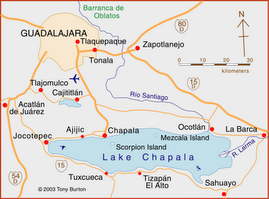Well, I've reached a point with the blog where I don't think I'll be able to come up with photos which necessarily go along with what I'm writing about. I want to keep you posted on how Pixie and I are doing and also make it interesting. So I plan to try to stick to a basic topic for each posting. However, I may put some irrelevant pieces into the posts, just to keep you updated on some irrelevant points! Overall, though, I want this to be a blog about what it is like to live in Mexico.
This brings me to the topic of today: medical care. Last week at the local market, I found a copy of Michael Moore's movie "Sicko" (before it was even released in most US theaters; don't ask, don't tell). I plunked down my 30 pesos and took the movie back to our casa to check it out. (Another interesting thing about living abroad is that DVD players are zoned differently around the world. Latin American DVD's won't play in a zone one player, only a zone 4 player. Europe has a different zone too, as does Asia, I think. So, we had to find a "multi-zone DVD player in Guadalajara to play all kinds of DVD's, because God knows what kind of DVD's they sell at the market!) At any rate, the movie is a provocative look at how the American medical system does not do a good job providing access to all American people, unlike France, England and Cuba. This was essentially a no brainer for me, but he did present his case well.
From the limited experience we've had so far with medical care in Mexico, it seems as though it is very good, and reasonably priced, if you can afford it, like me. Mexico does have a national health care system: IMSS. Anyone can join this system for a modest fee, and many employers offer it as part of their benefits package. I think the very poor, of which there are many, often are not enrolled. I'm not sure about this, though. The cost for us to join now would be about $200USD each, per year. There is a two year waiting period for full coverage. It covers everything from doctor's fees to hospital care to drugs, completely free. The catch is that there can be long waits for non-urgent care, and they may not always have all drugs in stock. Many gringos here enroll in it for emergency back up, but plan to go back to the US for Medicare if they can. We've heard all kinds of reports about IMSS, from rave reviews to horror stories.
The other option, which we have selected for now, is to purchase a good major medical plan with about a $2000 USD deductable, which will mean that you can get care at the best hospitals in Guadalajara and it will only cost $2000 at the most. The policies, at our ages, cost us $2300 for the first year, but prices will go up as we get older. So, by the time we are eligible for Medicare, we'll probably keep IMSS for emergencies here, but plan to return to the US if we became seriously ill, because the major medical coverage would eventually become too expensive.
To be honest, though, from what I've seen, I think I would prefer to be treated in Mexico. We have found a highly recommended doctor here in Ajijic. I went for a physical exam with him on Tuesday, and it was very thorough. I had the physical exam, which took about 45 minutes, and a series of typical blood tests. The entire bill was $108. (His exam fee was only $15). He wants me to have a colonoscopy sometime soon. That will cost $280. The office is not fancy. He has no nurse, and only one receptionist. He takes the blood himself. Because in Mexico, it is very difficult to sue anyone, physicians do not have to pay for malpractice insurance. They have a very low overhead. This doctor has specialists from Guadalajara visit his office each week: a cardiologist, an orthopedic surgeon, a urologist, a psychiatrist, a dermatologist, and others. He gave me his cell phone number to call him anytime, night or day, if I had a question or an emergency. If I have an emergency, he will call an ambulance and decide which hospital in Guadalajara would be best for that problem. If I am too sick to come see him, he will make house calls.
Now, of course, I have not been sick yet. But from what I've heard from the other expats who live here, the medical care they receive is top notch, and very caring.
We can buy prescriptions over the counter, and we are told many of them are cheaper. We don't know yet, because we haven't bought any. From the minor drugs like aspirin we've bought, they seem pretty similar in prices to the US.
We're hoping that we'll STAY healthier here. With regular walking, fresh fruits and veggies readily available, and the low stress of living here, that may be true.
A few personal notes: we are joining a Great Books discussion group. We hope that is as interesting as it sounds. Maggie has "wandered" away several times to explore the neighborhood on her own. Luckily, all three times, friendly Mexicans helped us find her. But much to her annoyance, she is now being CLOSELY supervised! We've been picking up a few Mexican items for the house, some of which are illustrated here. We also found our first SCORPION! It was on our patio, but it was dead. Finally, I am giving a sermon on Buddhism to our UU fellowship on Sunday, and leading the congregation in two hymns on my guitar and harmonica. That should be interesting!
Thursday, July 5, 2007
Subscribe to:
Post Comments (Atom)



































































1 comment:
When you wrote "Anyone can join this system for a modest fee..." that struck a chord in me. That's the fundamental aspect that I like about having a universal system. Everyone is in the same boat.
The last thing I think people should worry about is their finanical ability to pay for an illness. Instead, the focus should be on preventing sickness and getting good care when you are sick.
I know that universal health care is not perfect, but has anyone seen ANY survey that indicated that Brits, Canadians, Mexicans, etc. would trade their system for ours? The right-wingers may say, "sure, everyone wants a free lunch and it leads to socialism, lack of entrpreneurship, etc." Well, competition can be great for society. But shouldn't all, or at least as many people as possible, be healthy FIRST...so they can do other things...like compete?
Do you know how long are the "long waits for non-urgent care?" If the waits are reasonable, and when people are treated is NOT based on "who you know," but instead where they are in line OR how time-senstive their condition is (in regard to treatment), what's so wrong with that?
Post a Comment